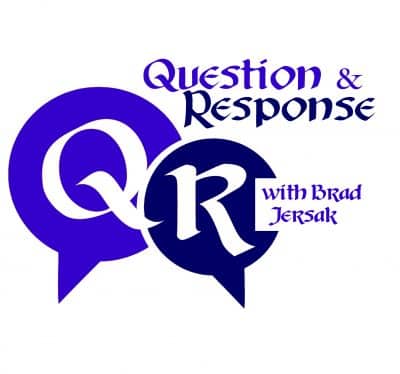Gospel Before Translation (pt. 3/3) – Brad Jersak
Gospel Before Translation: In parts 1 & 2 of this series, I claimed that the first Christian interpreters established in their hearts the gospel of Jesus Christ before they attempted to translate or interpret the Scriptures. Apart from that gospel, they believed the Bible could not be understood, much less translated, as inspired Scripture. The gospel formed and affected all of their translation work. Sadly, modern translators seem to pretend to be unbiased by their theology (but of course they are).
Our first two examples came from Isaiah 53:10, which affects our view of God, and Jeremiah 17:9, which informs our view of humanity. While modern translations feature God as taking pleasure in crushing his servant and describe the human heart as incurably wicked, I showed how the NT authors’ favourite translation of the OT (known as the Septuagint) rendered these verses much differently. For the LXX (the short name for Septuagint), it pleased God to cleanse or heal his servant (Isa. 53:10) and viewed the human heart, not as impossibly deceitful, but as wonderfully deep.
In this installment, let’s compare a few versions of Romans 5:9 (as I had in detail in A More Christlike God):
“Saved from God’s Wrath”
These first three translations translate verse 9 as if the Greek text were saying that Jesus death saves us from God’s wrath. Here they are:
- NIV: 9 Since we have now been justified by his blood, how much more shall we be saved from God’s wrath through him!
- ESV: 9 Since, therefore, we have now been justified by his blood, much more shall we be saved by him from the wrath of God.
- NTE: 9 How much more, in that case – since we have been declared to be in the right by his blood – are we going to be saved by him from God’s coming anger!
But is that what the Greek NT actually says? In fact no. In fact, here are two versions that include “the wrath of God” but at least have the decency to admit “of God” is not in the Greek text (not a single manuscript):
- NASB 9 Much more then, having now been justified by His blood, we shall be saved from the wrath of God through Him.
- NET 9 Much more then, because we have now been declared righteous by his blood, we will be saved through him from God’s wrath.
[NET note: Grk “the wrath,” referring to God’s wrath as vs. 10 shows.]
Do you see how the NASB italicize “of God”? When a translation does that, it means they’ve inserted the words because the translators feel it’s understood. By whom? It’s a blatant interpretive move.
In the NET, they don’t italicize “of God” but they do include a footnote, claiming that “of God” is referring to “God’s wrath” as vs. 10 shows. Does it? What does verse 10 actually say?
- For if while we were enemies we were reconciled to God through the death of his Son, how much more, since we have been reconciled, will we be saved by his life?
I can see how they make that move, but it’s still based on a theological assumption. It is we who were enemies of God, not God who was our enemy. It was we who needed to be reconciled to God, not God who was reconciled to us. And it was our wrath that God in Christ endured, not God’s wrath that was waiting to crush us.
Idea! What if we just translate the words that Paul actually used! Thankfully, a few translations are faithful to those parameters in this verse:
- KJV 9 Much more then, being now justified by his blood, we shall be saved from wrath through him.
- YLT 9 much more, then, having been declared righteous now in his blood, we shall be saved through him from the wrath;
What does God send Christ to save us from? Himself? Think about it and you would realize that makes little sense apart from some naughty indoctrination. That’s like me being enraged at my neighbor’s child, so I send my child over to his place to confront him, but my neighbor’s child beats up my child, so to forgive my neighbor’s child, I join in and beat my child too. So my son saved my neighbor’s child from me by having me forgive the neighbor by letting me beat him … oh never mind. Let’s return to reality. What’s really going on.
“The wrath” we’re saved from is not “the wrath of God.” Paul knows his Bible and the Jewish tradition. That helps. Paul knew his Septuagint, the Greek translation of the Hebrew OT that he often used. In that Bible, we find Wisdom of Solomon–a book in ALL Christian Bibles until the 1500s. And Paul is engaging the Wisdom of Solomon throughout Romans. Chapter 18 is a key text where we read:
- 22 So he overcame the destroyer, not with strength of body, nor force of arms, but with a word subdued him that punished, alleging the oaths and covenants made with the fathers.
- 23 For when the dead were now fallen down by heaps one upon another, standing between, he stayed the wrath and parted the way to the living.
What is “the wrath” that Yahweh’s servant overcomes? “The wrath” is another name for “the destroyer,” who by now, Jews no longer associated with God but with Satan. Jesus saves us, not from his loving Father, but is sent by his Father to save us from the wrath, the destroyer, Satan.
That translation is more in line with the gospel of Jesus Christ. And it’s more in line with the actual words of Paul. Maybe adding words isn’t a great idea after all. Maybe it actually exposes theological biases and agendas.
Then What? Which Translation?
When I draw out these discoveries, it frustrates people because they don’t know the original languages and don’t know which translation to trust. They don’t want to be dependent on scholars (they are anyway if they’re holding an English Bible). They don’t know which texts are most accurate.
Here’s the good news! You don’t need to know Greek or Hebrew and you don’t need to figure out what translation is most accurate. What you most need to know is the gospel! The gospel of Jesus Christ IS the best way to judge any given translation of any given verse. When you compare them side by side, the question is NOT which one best represents the first manuscripts but which one best represents the gospel.
In this series, I’ve shown readers many translations. Some felt better than others. Why? Because we want the translation that feels best? NO. They felt better because they resonated with the gospel we’ve come to know through Jesus. That doesn’t matter to all modern translators, but it mattered to the first Christians and it can matter to you, regardless of the word of supposedly unbiased translators (an oxymoron). What I’m saying is that your criteria for judging a translation is not your linguistic ability or your academic credentials. It is your personal knowledge of who Jesus is, the nature of God as he revealed it, and the gospel he preached.
Go with that.











 Plain Truth Ministries | Box 300 | Pasadena, CA 91129-0300
Plain Truth Ministries | Box 300 | Pasadena, CA 91129-0300

